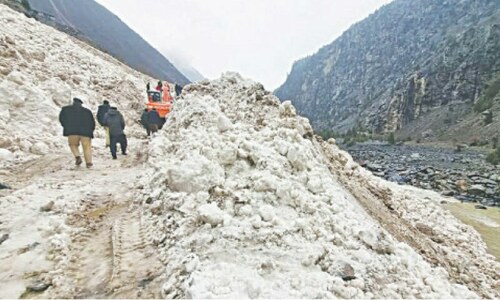The Supreme Court’s landmark decision to disqualify the prime minister has exposed the fragile and nascent democracy to a tough endurance test.
The system, fortunately, is expected to survive but the short-term cost to the economy is projected to be immense.
A leading light of the business community tossed a figure of $2 billion (about Rs210bn) to quantify the cost of the accountability process to the economy so far.
After the Supreme Court sent PM Nawaz Sharif packing, there is a lot at stake for democracy and the economy
He made a case for a prompt decision to call the next election, and for the completion of the process as early as possible, to keep the economy stable.
The instant market reaction to the verdict on Friday, the last working day of the week, was muted, as the capital and the currency markets broadly held ground.
There were reports of street protests from some places but Karachi, the financial capital of the country, showed no visible sign of any public reaction for, or against, the outcome of the case.
It was business as usual in the commercial districts and the vast industrial areas, as observed by Dawn staffers who drove around the city to gauge public mood.
Most businessmen approached shared their concerns about the emerging scenario but declined to go on record fearing a backlash from the establishment. They did not rule out the possibility of a crisis that could wipe out the gains of the past four years over the next four months.
The most vulnerable in their assessment was the currency market.
“The moment the SBP loosens its grip on the market, the rupee is destined to fall. The fortunes of the SBP governor, Tariq Bajwa, are too closely tied to the future of former finance minister Ishaq Dar, which appears dismal at this point,” a tycoon who heads a big business group told Dawn.
“A sudden, steep fall in the value of the rupee can trigger a chain reaction that could drag the economy to the edge,” he said.
Another business leader said, “Much will depend on the political conduct of parties and the capacity of the system to absorb the change, but no one expects the situation to return to normalcy without inflicting a blow to the economy in the process.
“The strategy should be to contain the damage. The assumption of change-makers that the currency, capital, property and commodity markets are immune to political changes is unrealistic.”
An executive argued: “Even countries with stable, established institutions need extraordinary measures to absorb political fallout. The growth story of Pakistan rests on a rickety base. A mild push could destabilise it.”
The gentleman who quantified the cost told Dawn, “The longer the period of uncertainty, the higher will be the cost to the country and its people.
“I can’t defend the $2bn claim convincingly, but if one adds up the value wiped out of the capital market, the cost of dollarisation and goldenisation that sucked out investible capital from the market, FDI diverted to other destinations, loss to businesses because of bureaucratic inaction and the direct cost incurred in the court battle, the number would probably be close.”
Another leader, who considered his colleague’s estimate too conservative, floated the idea of “truth and reconciliation” to stop what he calls “a journey on a long road to nowhere”.
“We can keep digging dirt or find a way to put a lid on the past and start focusing on the future. Allow people to accept their mistakes, penalise them nominally and grant them a second chance if they promise to honour the law of the land in letter and spirit.
“It is a highly competitive world. We already have a lot of catching up to do. We can’t afford the luxury of endless accountability, no matter how mesmerising it might be,” he insisted.
Dr Nadeem Javed, chief economist at the Planning Commission, was not convinced. He dismissed the idea of general clemency for wrongdoers. He did not think that the forward-moving wheel of the economy, oiled by investment under the CPEC, is reversible.
“Yes there will be ripples but they will die down as people and businesses will carry on with their lives. I am an incorrigible optimist and see good times ahead for the country and the economy,” he said.
He was not impressed with the ‘truth and reconciliation’ idea. “The amnesty schemes have not delivered in the past and I don’t think they would now.”
“Do you think the ongoing circus will end any time soon on its own? I am not a great fan of our crop of leaders. At stake, however, is not just the career of politicians but the future of the country,” a second generation leader of a leading business family remarked.
Asma Jahangir, known for fearlessly speaking her mind, casts doubts on the merit of the court’s decision. Speaking to Dawn she mentioned several critical apex court decisions from the country’s tumultuous history that did not serve the cause of democracy or development in Pakistan.
Published in Dawn, The Business and Finance Weekly, July 31st, 2017
















































